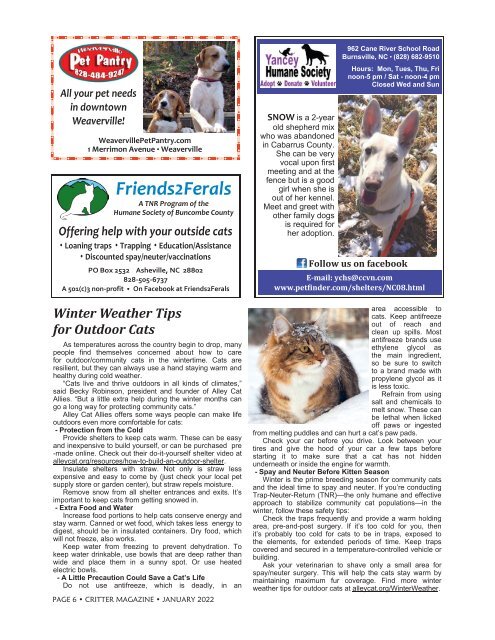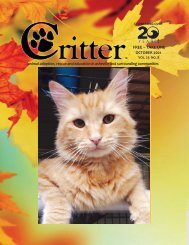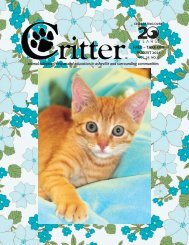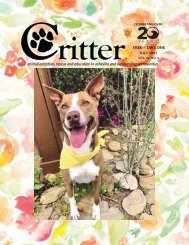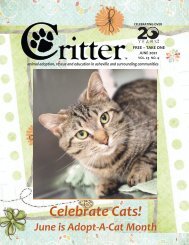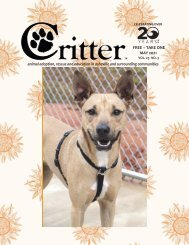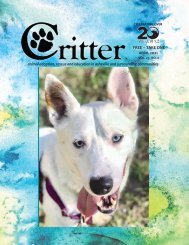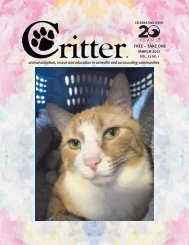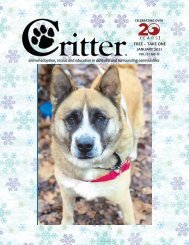You also want an ePaper? Increase the reach of your titles
YUMPU automatically turns print PDFs into web optimized ePapers that Google loves.
All your pet needs<br />
in downtown<br />
Weaverville!<br />
WeavervillePetPantry.com<br />
1 Merrimon Avenue • Weaverville<br />
Friends2Ferals<br />
A TNR Program of the<br />
Humane Society of Buncombe County<br />
Offering help with your outside cats<br />
• Loaning traps • Trapping • Education/Assistance<br />
• Discounted spay/neuter/vaccinations<br />
PO Box 2532 Asheville, NC 28802<br />
828-505-6737<br />
A 501(c)3 non-profit • On Facebook at Friends2Ferals<br />
Winter Weather Tips<br />
for Outdoor Cats<br />
As temperatures across the country begin to drop, many<br />
people find themselves concerned about how to care<br />
for outdoor/community cats in the wintertime. Cats are<br />
resilient, but they can always use a hand staying warm and<br />
healthy during cold weather.<br />
“Cats live and thrive outdoors in all kinds of climates,”<br />
said Becky Robinson, president and founder of Alley Cat<br />
Allies. “But a little extra help during the winter months can<br />
go a long way for protecting community cats.”<br />
Alley Cat Allies offers some ways people can make life<br />
outdoors even more comfortable for cats:<br />
- Protection from the Cold<br />
Provide shelters to keep cats warm. These can be easy<br />
and inexpensive to build yourself, or can be purchased pre<br />
-made online. Check out their do-it-yourself shelter video at<br />
alleycat.org/resources/how-to-build-an-outdoor-shelter.<br />
Insulate shelters with straw. Not only is straw less<br />
expensive and easy to come by (just check your local pet<br />
supply store or garden center), but straw repels moisture.<br />
Remove snow from all shelter entrances and exits. It’s<br />
important to keep cats from getting snowed in.<br />
- Extra Food and Water<br />
Increase food portions to help cats conserve energy and<br />
stay warm. Canned or wet food, which takes less energy to<br />
digest, should be in insulated containers. Dry food, which<br />
will not freeze, also works.<br />
Keep water from freezing to prevent dehydration. To<br />
keep water drinkable, use bowls that are deep rather than<br />
wide and place them in a sunny spot. Or use heated<br />
electric bowls.<br />
- A Little Precaution Could Save a Cat’s Life<br />
Do not use antifreeze, which is deadly, in an<br />
PAGE 6 • CRITTER MAGAZINE • JANUARY 2022<br />
SNOW is a 2-year<br />
old shepherd mix<br />
who was abandoned<br />
in Cabarrus County.<br />
She can be very<br />
vocal upon first<br />
meeting and at the<br />
fence but is a good<br />
girl when she is<br />
out of her kennel.<br />
Meet and greet with<br />
other family dogs<br />
is required for<br />
her adoption.<br />
962 Cane River School Road<br />
Burnsville, NC • (828) 682-9510<br />
Hours: Mon, Tues, Thu, Fri<br />
noon-5 pm / Sat - noon-4 pm<br />
Closed Wed and Sun<br />
Follow us on facebook<br />
E-mail: ychs@ccvn.com<br />
www.petfinder.com/shelters/NC08.html<br />
area accessible to<br />
cats. Keep antifreeze<br />
out of reach and<br />
clean up spills. Most<br />
antifreeze brands use<br />
ethylene glycol as<br />
the main ingredient,<br />
so be sure to switch<br />
to a brand made with<br />
propylene glycol as it<br />
is less toxic.<br />
Refrain from using<br />
salt and chemicals to<br />
melt snow. These can<br />
be lethal when licked<br />
off paws or ingested<br />
from melting puddles and can hurt a cat’s paw pads.<br />
Check your car before you drive. Look between your<br />
tires and give the hood of your car a few taps before<br />
starting it to make sure that a cat has not hidden<br />
underneath or inside the engine for warmth.<br />
- Spay and Neuter Before Kitten Season<br />
Winter is the prime breeding season for community cats<br />
and the ideal time to spay and neuter. If you’re conducting<br />
Trap-Neuter-Return (TNR)—the only humane and effective<br />
approach to stabilize community cat populations—in the<br />
winter, follow these safety tips:<br />
Check the traps frequently and provide a warm holding<br />
area, pre-and-post surgery. If it’s too cold for you, then<br />
it’s probably too cold for cats to be in traps, exposed to<br />
the elements, for extended periods of time. Keep traps<br />
covered and secured in a temperature-controlled vehicle or<br />
building.<br />
Ask your veterinarian to shave only a small area for<br />
spay/neuter surgery. This will help the cats stay warm by<br />
maintaining maximum fur coverage. Find more winter<br />
weather tips for outdoor cats at alleycat.org/WinterWeather.


